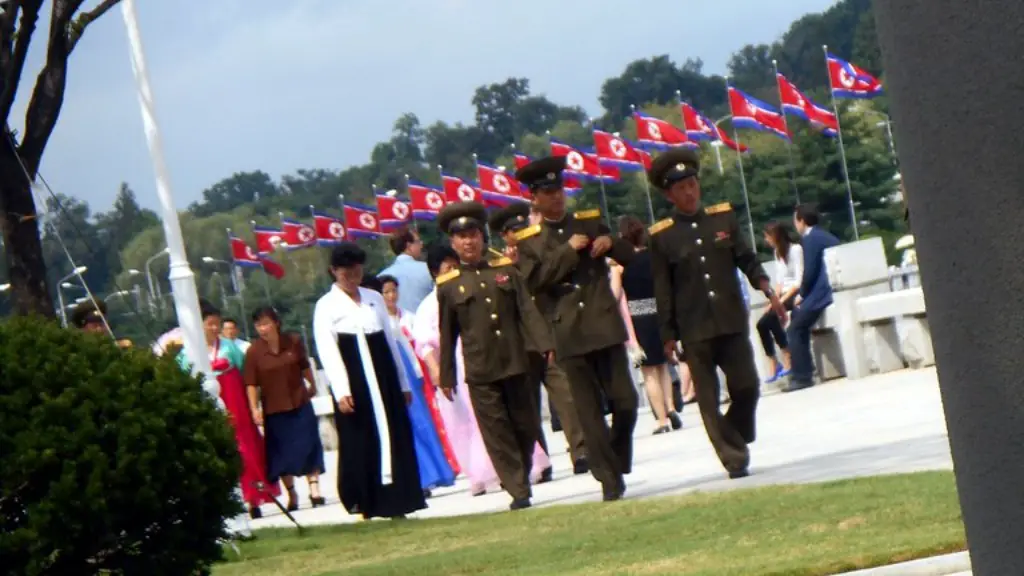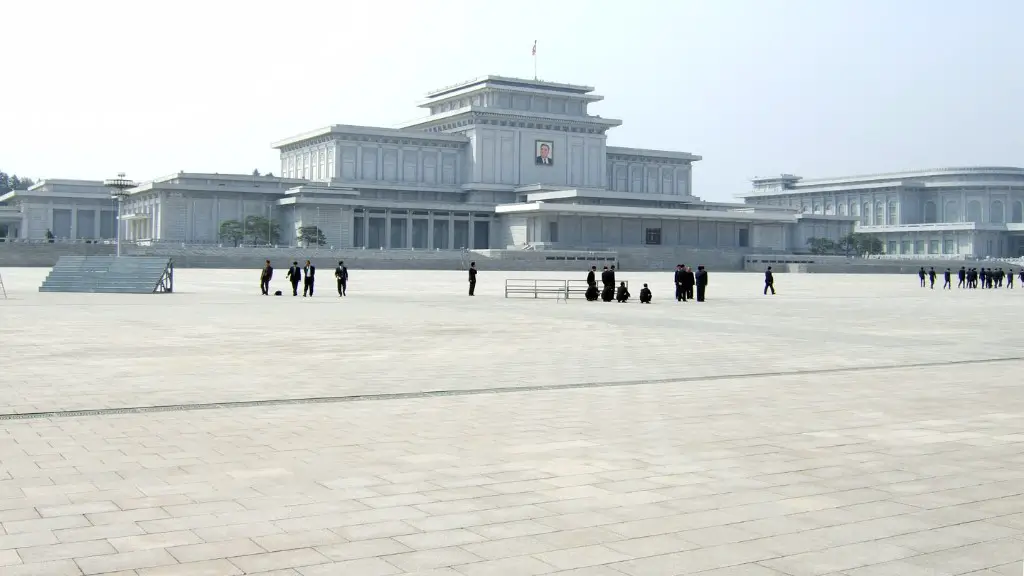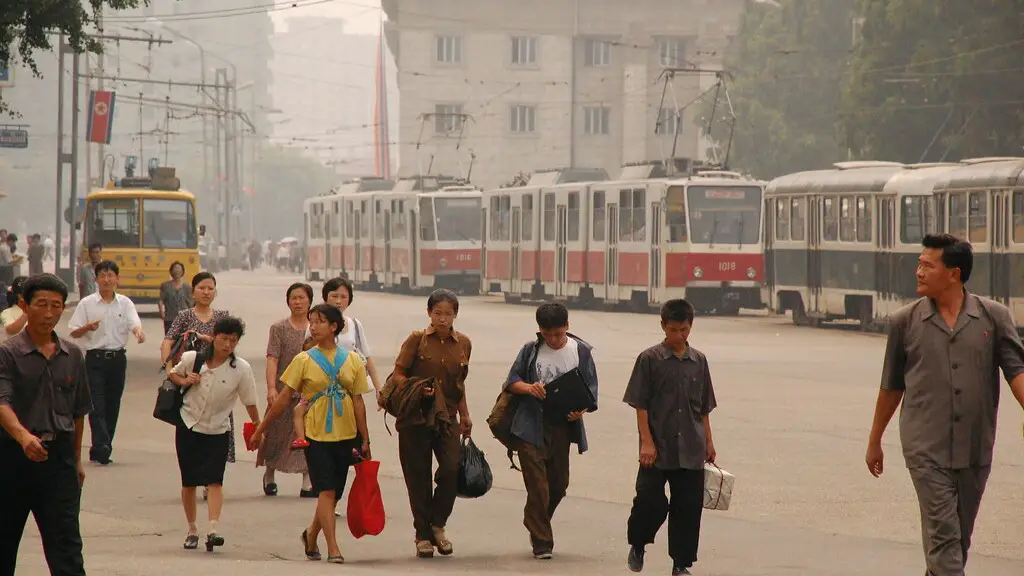Background Information
North Korea left the Non-Proliferation Treaty (NPT) in 2003, citing a US threat to the country. The NPT was established in 1968 and aimed to prevent the spread of nuclear weapons. North Korea had been a signatory since 1985, but disagreements with the US led to their withdrawal from the treaty. This marked a major shift in international relations and had ramifications around the world.
The US had warned North Korea not to develop nuclear weapons or weapons of mass destruction. In 2002, the US accused North Korea of violating the NPT and began talks to convince them to stay in the treaty. These talks ultimately led to North Korea leaving the NPT in protest.
The NPT would have ensured that North Korea did not develop nuclear weapons, but the US’s stance had forced their hand. North Korea was adamant that they did not want to develop nuclear weapons, but they were determined to acquire a deterrent against potential US aggression.
Relevant Data
It is estimated that North Korea has between 20 – 60 nuclear warheads. This number could increase if North Korea continues its nuclear weapons program. North Korea has also conducted at least five nuclear weapons tests since 2006.
North Korea’s violations of the NPT have been widely condemned by the international community. The International Atomic Energy Agency (IAEA) has monitored North Korea’s nuclear activities since 2003. The US, along with the other members of the UN Security Council, have reprimanded North Korea in response to their continued violations of the NPT.
Perspectives from Experts
Experts have had mixed opinions on North Korea’s decision to leave the NPT. Some believed that it was a necessary step in order to protect their sovereignty and deter the US from taking aggressive action. Others argued that leaving the NPT was the wrong move and would only further isolate North Korea and put them at odds with the international community.
Citing US threats and sanctions, some experts have argued that North Korea felt that leaving the NPT was the only way to protect their interests. After all, North Korea had been a signatory to the treaty since 1985 and wanted to respect its terms. However, the US’s aggressive stance made it difficult for them to do so.
Experts have also argued that North Korea’s decision to leave the NPT demonstrates the need for better diplomatic relations between the US and North Korea. It highlights the need for dialogue and for both sides to find a peaceful solution to the conflict. It is only through the strengthening of diplomatic ties that sustainable peace can be achieved.
Analysis
North Korea leaving the NPT was a major shift in international relations. It highlighted a growing rift between the US and North Korea and underscored the need for better diplomatic ties. It is clear that the US’s stance had a major impact on North Korea’s decision, and it demonstrates the importance of building better diplomatic ties.
It is also evident that North Korea’s fear of US aggression, and the need to protect their sovereignty, was an important factor in their decision to leave the NPT. However, this also highlights North Korea’s desire to acquire a nuclear deterrent, despite their refusal to develop nuclear weapons.
Ultimately, North Korea leaving the NPT was a major event and has had a significant impact on international relations. It is becoming increasingly clear that the US and North Korea need to find a peaceful solution to the conflict. In order to do so, the US must take steps to address North Korea’s concerns and build better diplomatic ties.
North Korea’s Nuclear Program
North Korea’s nuclear program has been a source of concern for the international community. North Korea has developed and tested several nuclear weapons, and there are estimates that they possess between 20 – 60 nuclear warheads. This has created a high risk of regional and global conflict, and the US and other countries have been attempting to convince North Korea to abandon its nuclear program.
The US has also imposed sanctions on North Korea in order to halt their nuclear program. This has had a major impact on North Korea’s economy, as the sanctions have hampered their ability to access the international market. This disadvantage has led to economic hardship and instability in the country.
North Korea has also denounced the sanctions and argued that they are a violation of international law. They have argued that the sanctions are an attempt to cripple the country and have made it clear that they have no intention of abandoning their nuclear program.
Despite the US’s attempts to convince North Korea to abandon their nuclear program, it appears that the country is determined to pursue it, even at the expense of economic hardship and instability. This has led to growing international tensions and distrust, and it is becoming increasingly clear that the US and North Korea need to find a peaceful resolution to the conflict.
International Response
The international community has responded to North Korea’s nuclear program with alarm and condemnation. The US, along with the other members of the UN Security Council, has imposed sanctions in order to halt North Korea’s nuclear program. The international community has also demanded that North Korea abandon its nuclear program, but so far the country has refused to comply.
The US and other countries have also engaged in talks with North Korea in order to convince them to abandon their nuclear program. These talks have been largely unsuccessful, however, and have highlighted the need for better diplomatic ties between the US and North Korea. It is becoming increasingly clear that diplomatic solutions will be key to finding a peaceful resolution to the conflict.
Ultimately, North Korea’s nuclear program is a major source of international concern. The international community has condemned the country’s actions and demanded that they halt their nuclear program. However, diplomatic solutions will be necessary if a peaceful resolution is to be achieved.
Impact on Human Rights
North Korea’s nuclear program has also had a major impact on human rights in the country. The US’s sanctions have caused economic hardship and led to widespread poverty in the country. The country’s healthcare system has also been heavily affected by the sanctions, as the lack of access to the international market has hampered their ability to provide adequate healthcare for the population.
The sanctions have also had a deleterious effect on North Korea’s education system. The country’s schools have closed due to lack of funding, and students have been forced to find employment in order to support their families. This has led to a situation in which North Korea’s education system is unable to adequately prepare the population for the future.
North Korea’s human rights abuses have also been documented by international organizations. Reports have highlighted the widespread issue of forced labor and torture in the country, as well as restrictions on access to information and free speech. The situation has been worsened by the US’s sanctions and has caused further hardship and suffering for the people of North Korea.
The impact of North Korea’s nuclear program on human rights in the country has been dire. The sanctions have caused widespread economic hardship and led to a further deterioration of the people’s rights. The US and other countries must take steps to improve the situation and ensure that North Korea’s human rights abuses come to an end.
The Future
The future of North Korea’s nuclear program is uncertain. It is clear that the US’s aggressive stance has had a major impact on North Korea’s decision to leave the NPT, and it is also evident that North Korea is determined to pursue a nuclear deterrent in order to protect their sovereignty. It is becoming increasingly clear that the US and North Korea need to find a peaceful solution to the conflict.
The international community must also take steps to improve diplomatic ties and find a peaceful solution to the conflict. Talks between the US and North Korea have been largely unsuccessful, but if both sides can come to an agreement it will be possible to find a peaceful resolution to the conflict. It is also important that the international community works together to ensure that North Korea’s human rights abuses are brought to an end.
Ultimately, it is clear that the US and North Korea must work together to find a peaceful solution to the conflict. The international community must also take steps to ensure that North Korea’s human rights abuses are addressed and the people are given the opportunity to live in a safe and prosperous environment. It is only through the strengthening of diplomatic ties between the US and North Korea that sustainable peace can be achieved.





